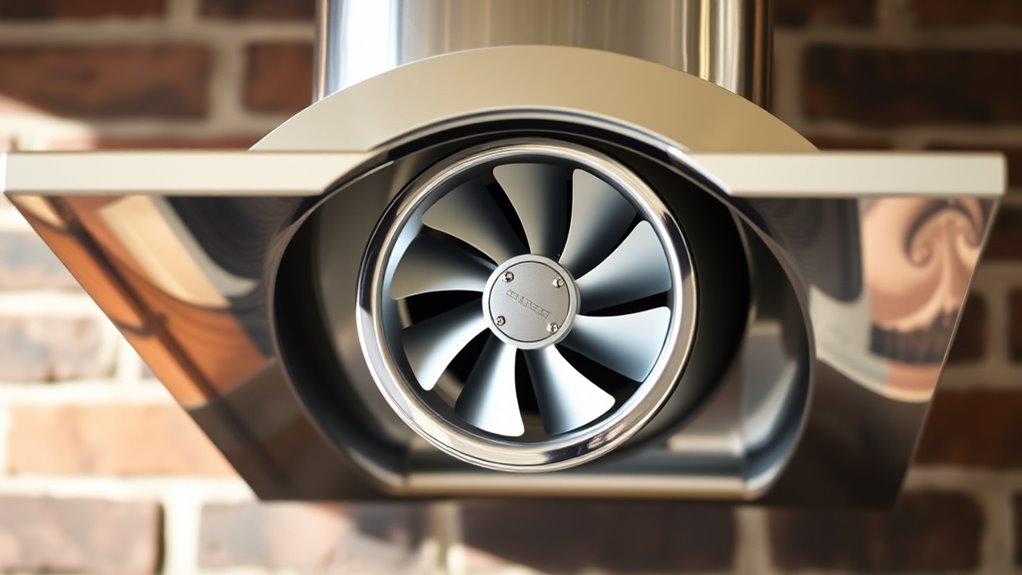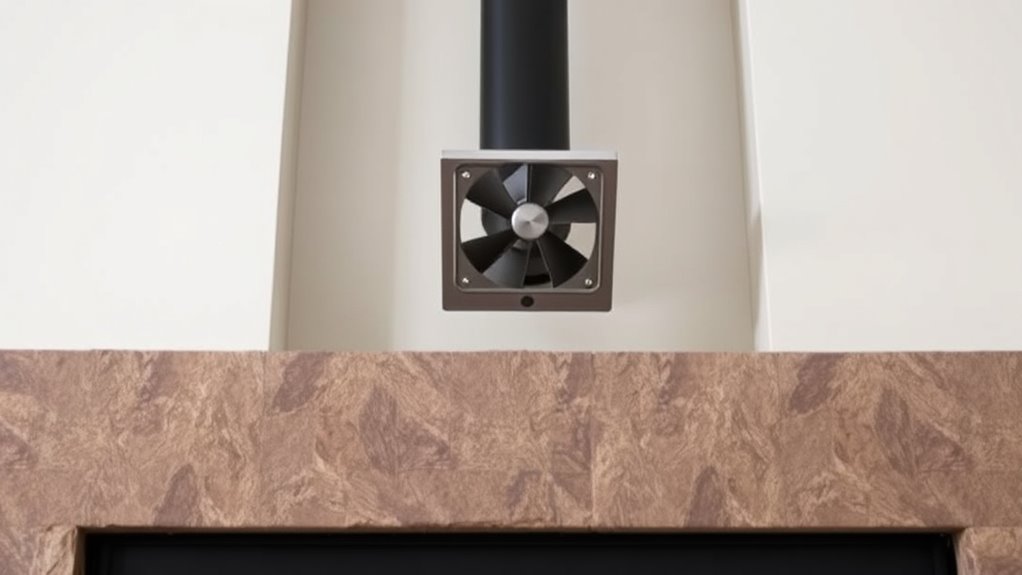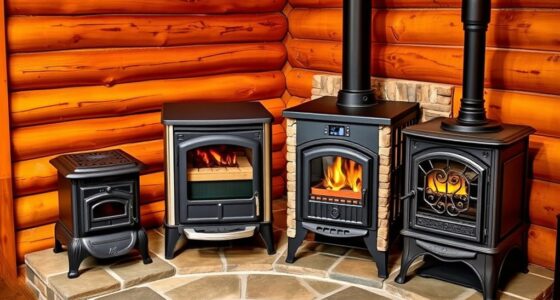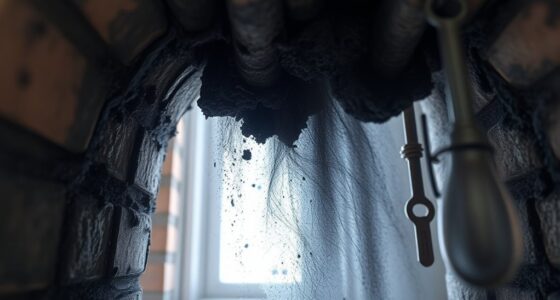If your chimney isn’t venting smoke effectively, adding a chimney fan or blower can improve airflow and indoor air quality. You might need one if you notice smoke spilling into your home, odors lingering, or poor draft performance. However, if your chimney is in good condition and vents well, a fan may not be necessary. Keep exploring to determine if a blower is right for your setup and how it can enhance your fireplace experience.
Key Takeaways
- Your chimney may need a fan if it has poor draft or ventilation issues affecting fire performance.
- Consider a blower if indoor air quality suffers from smoke, odors, or carbon monoxide buildup.
- Noise level preferences and quiet operation options are important when choosing a chimney fan.
- An assessment of your chimney’s condition can determine if a fan will improve its efficiency.
- Consult a professional to ensure proper fan selection and installation tailored to your chimney’s needs.

Are you wondering whether your chimney needs a fan or blower to work efficiently? If so, you’re not alone. Many homeowners face this decision, especially when they notice lingering smoke, unusual odors, or inadequate heat distribution. Adding a chimney fan or blower can markedly improve your fireplace or stove’s performance, but it’s essential to understand how it impacts ventilation efficiency and noise levels.
A primary reason to contemplate a chimney fan is to boost ventilation efficiency. When your chimney isn’t drawing smoke and gases out effectively, it can lead to poor indoor air quality and even safety hazards like carbon monoxide buildup. A fan helps create better airflow, pulling out smoke more quickly and keeping your living space comfortable. It can also help reduce drafts and prevent smoke from spilling into the room, especially if your chimney has a less-than-ideal draft. If you find that your fireplace struggles to vent properly or if your home feels smoky even when the fire is out, adding a fan could be a practical solution to improve overall ventilation efficiency.
However, it’s important to also evaluate noise levels. Some chimney fans operate quietly, barely noticeable when in use, while others can produce a humming or whirring sound that might be disruptive, especially in quiet environments or bedrooms. If noise is a concern, look for models specifically designed for low sound emissions. Modern fans often come with adjustable speeds, allowing you to balance ventilation needs with acceptable noise levels. Think about your typical usage; if you often enjoy fires during the evening or want a peaceful atmosphere, choosing a quieter fan will enhance your experience without turning your cozy space into a noisy environment.
Before installing a fan or blower, assess your chimney’s current performance. If your chimney already vents efficiently but you’re still experiencing issues, a fan might not be necessary. Conversely, if your chimney is old, blocked, or poorly designed, a fan won’t fix underlying problems but can help optimize what’s already there. Keep in mind that a poorly installed or incompatible fan can sometimes cause more harm than good, leading to improper draft or increased noise. Consulting a professional to evaluate your chimney’s condition and recommend the right fan type ensures you get a solution tailored to your needs.
In the end, whether you need a chimney fan or blower depends on your specific circumstances. Improving ventilation efficiency is often the main goal, but it shouldn’t come at the expense of excessive noise. By carefully weighing these factors and seeking expert advice, you can make an informed decision that enhances your fireplace’s performance without sacrificing comfort.
Frequently Asked Questions
Can a Chimney Fan Improve Indoor Air Quality?
A chimney fan can improve indoor air quality by enhancing ventilation and reducing smoke, odors, and pollutants. If your home has poor ventilation needs, a fan helps circulate fresh air and expel harmful particles. It’s especially beneficial if you notice lingering odors or smoke. You’ll find that adding a chimney fan creates a healthier environment, ensuring better indoor air quality and more comfortable living conditions.
Are Chimney Blowers Energy-Efficient?
Chimney blowers are generally energy-efficient since they help improve heating and cooling, reducing your overall energy costs. They often lead to cost savings by optimizing airflow and temperature control. However, they can produce noise levels that vary depending on the model, so choose one with quieter operation if noise concerns you. Overall, a well-chosen chimney blower balances energy efficiency and noise, making it a smart addition for most homes.
How Loud Are Chimney Fans During Operation?
Chimney fans are surprisingly loud, with noise levels comparable to a vacuum cleaner or a lawnmower roaring nearby. During operation, you might feel like a jet engine is taking off right in your living room. While some models are quieter, most produce a sound that can be heard clearly, especially if you’re close by. Expect a persistent hum, so if silence is your goal, choose carefully.
Do Chimney Fans Require Professional Installation?
Chimney fans generally require professional installation to guarantee safety and proper function. The installation costs depend on the chimney fan types you choose, such as inline, exterior, or direct-vent models. While some DIY-savvy homeowners may attempt installation, a professional ensures your fan is correctly set up, reducing risks and maximizing efficiency. Investing in expert help guarantees your chimney fan operates smoothly and safely, making it well worth the expense.
What Maintenance Is Needed for Chimney Blowers?
Maintaining your chimney blower is like giving it a daily tune-up to keep it running smoothly. You should regularly clean the blower and inspect for debris or damage, especially around the motor and fan blades. Lubricate moving parts as needed and replace any worn components promptly. Proper chimney maintenance not only extends your blower’s lifespan but also guarantees efficient operation, keeping your fireplace safe and cozy all season long.
Conclusion
If you’re wondering whether to add a chimney fan or blower, remember it’s often a case of “better safe than sorry.” Installing one can improve airflow, reduce smoke buildup, and keep your home smelling fresh. If your chimney struggles to draft properly, don’t wait until problems pile up. It’s better to get ahead of the game now than deal with bigger headaches later. Trust your instincts—sometimes, a little extra help makes all the difference.










